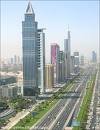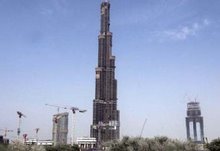
Wednesday, January 23, 2008
Subscribe to:
Post Comments (Atom)
Blog ini mungkin dapat membantu anda untuk mencari rezeki halal di bumi UAE





The transformation of Dubai from dusty desert town to sparkling, affluent metropolis has been underway for the past 40 years and it is really in the last 10 years that the pace of development and change has really begun to show. Dubai has gone from being a location where only people desperate enough for hardship allowances moved to work, to a stunning city where a hedonistic lifestyle can be enjoyed by almost everyone.
However, not everything about Dubai and its transformation has been wonderful and in this warts and all account we reveal the truth about living in Dubai, the good, the bad and the little mentioned!
The Good
Climate – between October and June the weather in Dubai is ideal; bright sunny days can be enjoyed as the temperatures are comfortable rather than stiflingly hot. From July to September inclusive it does get over-hot and in the winter it can occasionally rain, but most of the time the climate in Dubai is attractive.
Beaches – Dubai is blessed with stunning beaches, many of which have been augmented with the addition of fantastic beach clubs where all the family can enjoy a great day out.
Lack of Crime – because crimes are punishable so severely, crime levels are incredibly low in Dubai – by the way, you might want to bear in mind that if you get a point on your driving license when in Dubai you’re looking at jail time!
Shopping – yum, yum, yum – all the most wonderful shops in one fantastic location! You have everything from the likes of Ikea and H&M on the affordable side to every conceivable designer outlet on the other side!
Tax Free – tax free salaries….need I say more?
The Lifestyle – pubs, beach clubs, amazing restaurants, sports clubs, parties and much, much more besides –
living in Dubai the lifestyle is everything!Price of Petrol – currently everyone in Dubai jokes about the fact that it’s cheaper to buy petrol than mineral water.
The Bad
Property Prices – if you bought property in Dubai a couple of years ago you won’t care about this point, but for anyone else knowing that the price of property in Dubai has been spiralling upwards for the past few years means that it is depressingly expensive to get on the property ladder.
Rental Rates – rental rates are even worse! They shot up as there was a lack of property stock and an abundance of demand, those landlords who had properties to rent took what they could before the government capped annual rental rate increases but this means that today prices are sky high. Jumeirah and Umm Suqeim are popular but seriously expensive areas to rent a home, those with a bit less cash in their pockets to chuck away on rent could look at either Barsha or Mirdif – but for the most of us even these locations are too dear.
The Driving – driving in Dubai is stressful – on Sheikh Zayed Road drivers will do anything to get ahead including using the hard shoulder as an additional lane. If you can keep a calm head you’ll be alright but if you get easily riled expect to have high blood pressure.
Infrastructure – roads are clogged, rush hour traffic is atrocious, drains are overflowing and Dubai has grown faster than its infrastructure has developed meaning that it is beginning to really creak!
Summer Temperatures – while the climate is usually fantastic between October and May, it’s a killer in July and August and it can be dangerous for young children and older people because temperatures average above 40 degrees centigrade every single day. Those expatriates living in Dubai usually try and get away from the emirate during these months or else spend their entire time in an air conditioned environment.
School Fees – schools fees in Dubai are extortionate and not likely to reduce because the international schools that are there know they have a captive audience. School fees really must not be underestimated or overlooked by anyone with a family considering relocating to the emirate.
The Little Mentioned
The Humidity – while summertime temperatures are a bad thing, the humidity which can reach up to 80% coupled with temperatures in excess of 40 degrees centigrade makes living in Dubai in the summer unpleasant – to say the least!
No More Medical Cover – most companies no longer provide their expatriate staff with an allowance for medical care – this means expatriate health insurance is a must and an additional expense to face.
No More Education Allowances – in the good old days companies used to lure staff to Dubai with allowances for all sorts of things including the education of their children, sadly Dubai is now too nice a place with too many people all competing for jobs and so employers no longer have to bother with offering such attractive incentives.
Get Recruited First – if you want to work in Dubai get a job before you come! You are far more likely to get a better financial deal and a more attractive employment package than if you find work locally.
You Need a Degree – if you haven’t got a degree your employer may find it hard to get a visa for you, you will be paid less and you may not get into managerial positions at all.
Living in Sin – it’s not acceptable for an unmarried couple to cohabit – so the best way round this is to avoid situations where you will have to admit to being unmarried!
Rain – contrary to popular belief it can and does sometimes rain in Dubai – and when it does rain even the most expensive houses have been known to leak dramatically, drains block, roads flood and there is mud everywhere.
Those who work in Dubai work long hours for up to six days a week, and in certain industries salaries are impressive – but in other job sectors wages are on a par with or worse than the income that can be earned elsewhere. Therefore those looking for jobs in Dubai should take care to do proper research and due diligence before committing themselves to a career move.
All the major recruitment companies have a base in Dubai as there is a large and expanding jobs market in the UAE, it’s possible to use these recruitment companies’ websites to get a feel for the jobs being offered and rates of pay available in your particular industry sector.
Another way to get a feel for the level of income you could earn from a job in Dubai is by researching which employers from your industry are based in the UAE and then writing to their personnel department with your CV or resume and asking about suitable vacancies.
Of course salary is not necessarily the be all and end all of job hunting – especially in Dubai where it’s usual for an employer to present a remuneration package offer to a potential candidate. Such a package may include a housing allowance, health care benefits and even money towards children’s education.
Therefore assessing rates of pay is less simple than at first glance. Both housing and schooling in Dubai are expensive and any offer of assistance from an employer should be seen as being very valuable and should be taken into account with income offered and then compared with the hours that will need to be worked each week to determine whether the offer is attractive or not.
As stated the working week in Dubai is long for the majority of people – working hard and socialising hard is a way of life in the emirate. Those seeking jobs in Dubai should try and get a feel for what life will be like in the emirate for them and any accompanying family members and should be willing to accept that twelve hour shifts are the norm.
If you’re looking for a job in Dubai and are committed to your career, happy to put in the hours, free to socialise whenever you want and available to network whenever you need then Dubai could well represent a great opportunity. If on the other hand you’re travelling with family and considering jobs in Dubai where you will have to work long hours then you need to accept and be comfortable with the fact that you will probably have less free time to spend with your family.
Forums are a good place to get feedback from people already living and working in Dubai and recruitment companies are a good place to get practical advice about finding a job, securing a visa and relocating to the UAE.

The bottom line is that the cost of living in Dubai is quite high, but the standard of living is also very high and because personal taxes are non-existent in the emirate this reduces the overall financial burden for those living and working in the UAE.
Those who are headhunted, relocated or offered a good job in Dubai should consider negotiating a housing package as part of their overall remuneration deal because renting property in Dubai is the single highest outlay that the majority of people face. It’s a fact that there is limited completed housing stock available in Dubai at the present time and this has meant that landlords have been able to push up rental rates which in turn has inflated the cost of living in Dubai.
The government has placed a cap on annual rental rate hikes but this does not remove the fact that affording accommodation in the emirate is expensive!
For those who choose to buy property in Dubai the choice of off-plan properties is huge, but until those properties are completed purchasers will still have to rent. The amount of completed real estate on the market available for sale is limited.
In terms of current rental rates chargeable in Dubai they vary from district to district and property type to property type. A quick hunt around letting agents today reveals furnished 2 bedroom apartments in Dubai Marina available for RM8,000 a month and a one bedroom unfurnished apartment available in Dubai Marina for RM80,000 annually for which the tenant would have to pay the total in a maximum of two instalments. Villas and serviced apartments are also available throughout the emirate with villas starting from RM7,000 a week.
After accommodation one of the most expensive aspects of living in Dubai is socialising, and because the emirate is such a sociable place with everyone meeting to network, make friends and relax, expats living in Dubai will often find they eat and drink out a few times a week.
Additional expenses that some tend to overlook initially include health care and education services for those who travel with their families to live in the emirate.
Private schools in the UAE are expensive although the standards of education are generally very high. Private expatriate health care is also expensive and anyone should consider shopping round for the best health insurance policies. Other regular expenses incurred will include taxi travel and/or petrol as well as maid or cleaning services which are all relatively inexpensive – although a lot will depend on the budget you’re going to have to live on in Dubai!
There are definitely ways to cut down on the cost of living by flat sharing, cutting down on nights out and shopping locally in markets and smaller shops rather than in large malls and supermarkets – but most people who are moving to Dubai are moving to experience the Dubai lifestyle as much as anything!
If you’re going to live in Dubai, Abu Dhabi, Fujairah, Sharjah or Al Ain for example, you should consider researching your options on the internet and applying online to get your children into your preferred school before you actually relocate to the UAE.
Some international employers who offer their employees relocation packages to the UAE will include school fees as part of the overall remuneration deal; otherwise if you’re seeking employment in the UAE and believe you’re in a good negotiating position try and have school fees included in your contract. As you can imagine the best schools charge the highest fees and these can seriously eat away an otherwise attractive tax free salary.
In Dubai specifically, the number of international schools is increasing all the time as the population of the emirate expands rapidly and demand for quality education establishments grows. The Dubai English Speaking School for example has expanded to its limits and is now opening a brand new secondary school in 2006 to cater for ever increasing student numbers.
International expatriates have a range of schools to choose from and choice is likely to be dictated by both location and curriculum. The majority of schools have a website where the curriculum, method of teaching and annual fees are discussed and where parents and pupils can get a feel for the school environment. If securing accommodation in UAE is also on the expatriate’s list of things to do it might be best to secure school places for children before finding an apartment or villa to rent as schools are spaced out across the UAE and traffic can be quite chaotic at times making it difficult to travel far at peak times.
Ideally find and secure school places in a school as close to your work base as possible and then find accommodation in between the two to avoid grid lock and traffic jams in the morning. Most international schools have bus services which can ease the strain on working parents, but it is still sensible to be as accessible as possible to both your children’s school and your place of work
Malaysians like those who herald from the UK or USA have the greatest choice of schools in UAE because the majority of establishments follow either the British or American curriculum, some are Islamic. For those seeking alternatives there are French schools in Dubai and Al Nasr and there’s an Australian school and a German school in Sharjah. For a detailed listing of international, British and American Schools try http://english-schools.org/ and for a list of schools specifically in the UAE try http://www.theemiratesnetwork.com/dir/Education/Schools/ where the schools are divided by emirate and where you can find internet links to the majority of institutions listed.
No comments:
Post a Comment